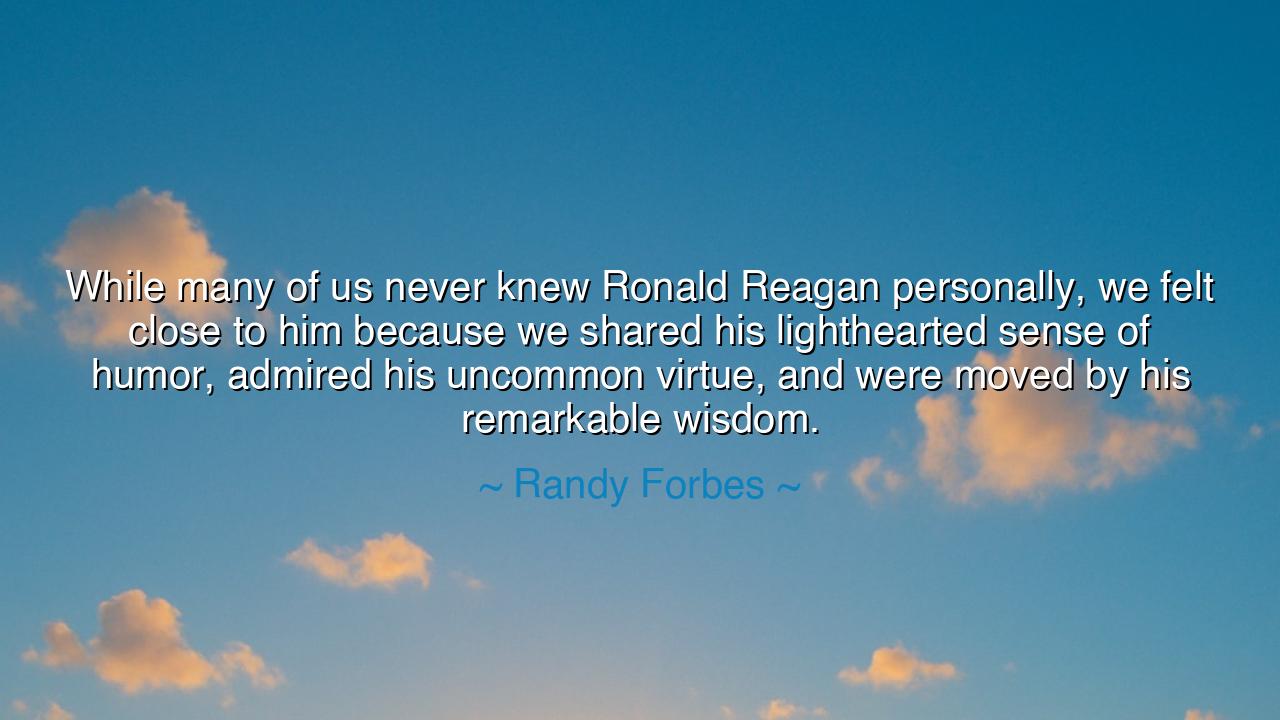
While many of us never knew Ronald Reagan personally, we felt
While many of us never knew Ronald Reagan personally, we felt close to him because we shared his lighthearted sense of humor, admired his uncommon virtue, and were moved by his remarkable wisdom.






“While many of us never knew Ronald Reagan personally, we felt close to him because we shared his lighthearted sense of humor, admired his uncommon virtue, and were moved by his remarkable wisdom.”
Thus spoke Randy Forbes, honoring a leader whose presence transcended the walls of politics and entered the realm of timeless character. In these words lies a meditation not only on Ronald Reagan, but on the enduring nature of humor, virtue, and wisdom — the three lights that guide all who lead, and all who live. Forbes reminds us that greatness is not measured by proximity or power, but by the ability of one soul to touch countless others through integrity, laughter, and truth.
To “share his lighthearted sense of humor” is to remember that even in the gravest moments, joy is strength. Reagan, though burdened with the weight of nations, never lost his smile. In his laughter, people found courage; in his wit, they saw the humanity of leadership. Like the kings and philosophers of old, he understood that humor is not trivial — it is a reflection of inner peace, a weapon against fear, and a bridge between hearts. The ancient poet Homer wrote that even the gods laughed, for laughter restores balance to a world too often drowned in solemnity. So too did Reagan’s humor heal the weariness of his time, proving that a leader who can laugh without cruelty and speak with warmth commands not only obedience, but affection.
Forbes also praises Reagan’s “uncommon virtue,” a phrase that resonates with moral grandeur. True virtue, the ancients taught, is not the absence of temptation, but the mastery of it. It is the harmony between principle and action, between belief and behavior. In an age where power often corrupts, Reagan’s strength lay in his simplicity — a steadfast belief in honor, faith, and the dignity of man. He walked with humility among greatness, and with hope among hardship. In this, he mirrored the Stoic emperors of Rome, such as Marcus Aurelius, who wrote that “the noblest kind of beauty is that which shines from within.” Reagan’s virtue, like the emperor’s, was not ornamental but essential — a quiet radiance that uplifted those around him.
Then comes the heart of the quote — “we were moved by his remarkable wisdom.” For wisdom is not knowledge, nor cunning, nor eloquence. It is the union of experience and understanding, born from trial and tempered by compassion. Reagan’s wisdom lay not in intellectual vanity, but in clarity — the ability to see the simple truth when others were blinded by complexity. Like the ancient philosopher Solon, who once said that wisdom is “to know what is just and to do it,” Reagan’s mind saw through the fog of politics to the enduring values of faith, freedom, and human dignity. In his speeches, there was no deceit; in his vision, no despair. He spoke as one who had walked through shadow and chosen to carry light.
Forbes’s words remind us that a man’s true power lies not in his office, but in his spirit. “We felt close to him,” he says, though most had never met him. This closeness is the mark of authentic greatness — the ability to awaken goodness in others without command or demand. The same could be said of prophets, poets, and heroes throughout time: Abraham Lincoln, who led with sorrow yet smiled through grief; Nelson Mandela, who forgave his captors and taught the world the strength of mercy. Such figures bind hearts not through dominance, but through shared humanity. Reagan’s humor, virtue, and wisdom became a common language for his people — a mirror through which they saw their better selves.
The origin of this quote lies in remembrance — in the collective act of honoring one who became more than a man, but a symbol of enduring character. Randy Forbes, a public servant himself, spoke these words as a eulogy of the spirit, a tribute to the light that outlives the flesh. He recognized that leadership, when fused with humility and joy, becomes immortal. The Greeks called this arete — the excellence of soul that inspires generations long after memory fades. So it is with Reagan, whose life continues to teach that laughter can conquer fear, virtue can outshine ambition, and wisdom can steer a nation toward grace.
So, O listener, take this lesson as your own:
-
Cultivate humor, not as mockery, but as the gentle strength that heals division.
-
Pursue virtue, not as perfection, but as constancy — to do what is right even when unseen.
-
Seek wisdom, not in complexity, but in clarity and compassion.
-
Inspire others, not by title or power, but by being the light they wish to follow.
Thus spoke Randy Forbes, and through him the echo of all who have understood the secret of lasting influence: that a great soul does not command reverence — it earns it. The laughter that eases pain, the virtue that resists corruption, the wisdom that steadies hearts — these are the pillars of immortality. Let every man and woman remember: the true leader is not the one who stands above others, but the one who lifts others through the radiance of humor, virtue, and wisdom.






AAdministratorAdministrator
Welcome, honored guests. Please leave a comment, we will respond soon